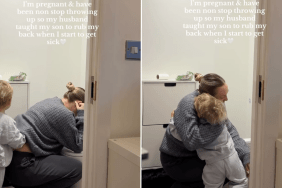My now-fourteen-year-old son had a speech delay he had received speech therapy for as a toddler, which was caused by hearing issues we took care of with ear tubes. He graduated for a while, but then was diagnosed with a stutter right before middle school. It wasn’t what one usually thought of as a stutter, so I was surprised by the diagnosis. I knew he sometimes started and stopped sentences at the beginning of conversations, but figured it was a combination of shyness and having a little sister who NEVER STOPPED TALKING. Allowing the professionals to investigate it, trusting in their offer of help, and being open to new therapy turned out to be an absolute gift to us both.
I’ve heard other kids of various ages speak the same way he did both times he was in speech therapy, but I now know to never—not even privately—tell their parents what I hear. Since the beginning of my son’s speech journey, I’ve had countless conversations with parents who didn’t want their kids evaluated, refused to acknowledge the delay in front of them, or get straight-up mad that I was so willing to openly talk about my own child’s experience with it.
Like his toddlerhood delay or elementary-aged stutter were things we should hide. Like asking for help was a parenting flaw. This befuddled me, for my son’s need for assistance was nobody’s fault, and wasn’t it a nice thing for me to get him the help he needed?
Every therapist I’ve quietly asked about this over the years said they’ve observed students per the school’s concerned request, only to have their free in-school services angrily rejected by the parents. For reasons that had to do with personal preference, it was always more likely that their offers to help the children would be turned away rather than accepted. Leaving a child who could use the extra hand without the opportunity to even reach for it.
In our case, I was truly grateful for everyone who stepped in to try to work with my son. I’ve always known that while I’d do my best at helping my kids with whatever they needed, I’d need to rely on experts at times. If you don’t know something, you just don’t know, right? My son was my first kid, he was being brought up in a different way in a different world than I had been, so of course there’d be times when other people knew best. And that was okay by me.
Once we were enmeshed in the world of speech therapy, I learned about speech delays, tricks and tools to help my son’s particular case, and observed other kids getting therapy along the way. It was our “normal,” this need for therapy, moving forward with getting it, and spending time with other families in the same boat. This became one more thing I gained expertise on, and was happy to help others out with should they ask. Just like baby eczema or where to find shoes for particularly small toddler feet or how to manage having two kids less than two years apart, being a speech therapy mom was part of my arsenal of parenting tools.
But unlike just about every other one of those tools, this was the one that I learned the hard way to keep to myself. And I wish I didn’t have to.
My son has never been embarrassed by his speech therapy. Heck, when I asked his permission for me to write this, he told me to stop being weird and just do it. I also have never felt like that whole experience was something to hide, either.
Honestly, I didn’t even know my son had a stutter until the pros stepped in to tell me, and he’s so much better for it. In-school services gave him the ability to smooth out the stutter, which made expressing himself clearly much easier. This improved his personal conversations, but also positively affected his GPA by making oral presentations easier for him to do—and for his teachers to grade well.
I know that everyone has their reasons for the decisions that they make for their children, and nobody owes anyone explanations. But I still want to encourage parents to be willing to accept or ask for help for their kids. Not only is it beneficial for our kids to receive the help they need, in itself, but I believe it’s beneficial for our kids to see us—people who in their eyes are perfect—be open to accepting help. Genuinely welcome assistance when offered, or go fight for it when we know it’s needed. Whether it’s a speech delay we don’t recognize or anything else. We are not in this alone, and it might be a good idea to let our kids know they don’t have to be, either.








